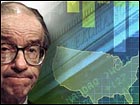|
Greenspan leaves door open
|
 |
January 11, 2002: 3:02 p.m. ET
Central bank chairman says the economy still faces "significant" risks.
|
NEW YORK (CNN/Money) - Federal Reserve Chairman Alan Greenspan offered a mixed diagnosis of the health of the U.S. economy Friday, leading analysts to believe central bank policy makers could be poised to cut interest rates again to insure tentative signs of recovery take hold.
Greenspan, in prepared remarks delivered in San Francisco, said recent economic data have gone from "unrelentingly negative" to "mixed," raising hopes that an imminent recovery apparently delayed by the terrorist attacks of Sept. 11 could finally be coming.
"There are sound reasons for concluding that the long-run picture remains bright, and even recent signals about the current course of the economy have turned from unremittingly negative through the late fall of last year to a far more mixed set of signals recently," Greenspan said. "But I would emphasize that we continue to face significant risks in the near term."
Corporate profits and investments are still suffering, he pointed out, and resilient consumer spending is threatened by surging unemployment, lower stock prices and a housing market weakened by rising mortgage rates.
Wall Street, studying Greenspan's remarks for hints about whether or not the Fed will cut rates again after its next policy meeting, scheduled for Jan. 29-30, responded by sending stock prices lower.
The Fed cut interest rates 11 times in 2001 to fight a recession that many economists think began in March, and some analysts thought Greenspan's remarks, which echoed recent statements by other Fed officials, hinted there was room for at least one more cut.
"It seems to me that he's keeping the door open for rate cuts," Carey Leahey, senior economist at Deutsche Bank Securities, told Reuters. "It's a little more negative on the economy than I expected."
On the positive side, Greenspan said businesses appear to be lowering the level of their unsold goods. Once inventories are reduced, businesses can begin producing new goods and hiring workers again.
"A slowing in the rate of inventory liquidation will induce a rise in industrial production if demand for those products is stable or is falling only moderately," Greenspan said. "That rise in production will, other things being equal, increase household income and spending."
Click here for more on the Fed and rates
But demand must rise in order for such an increase to be long-lasting, Greenspan said. Despite lower energy prices, the outlook for consumer spending, which fuels two-thirds of the economy, is "mixed," Greenspan said.
He also pointed out that this recession was initiated by a slowdown in corporate spending and implied that corporate spending would also be responsible for fueling the recovery.
Business spending has also been hurt by falling stock prices and profits, Greenspan said, but job cuts and technology improvement will boost productivity, boosting profits and spending in the future.
"If the recent more favorable developments continue and gather momentum, uncertainties will diminish, risk premiums will fall, and the pace of capital investment [will] increase," he said. 
|
|
|
|
|
|

|

